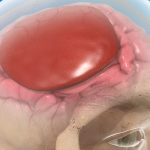
Key facts
- Sinusitis is an inflammation of the hollow spaces in the skull between/behind the eyes, forehead and cheeks.
- Symptoms of sinusitis may include nasal discharge and obstruction, changes in smell and facial pain or pressure — symptoms may worsen when bending over or radiate to your teeth.
- Sinusitis is usually caused by a bacterial infection following a viral infection such as the common cold.
- You doctor can usually diagnose sinusitis by talking to you about your symptoms and by examining you.
- To treat sinusitis your doctor may prescribe medicines including regular pain relief, a saline nasal spray, a nasal decongestant, inhaled steroids or an antibiotic.
What is sinusitis?
Sinusitis is when the hollow spaces between and behind the eyes, forehead and cheeks become inflamed. Your body will often overcome the cause of inflammation in about 3 weeks without the need for medical treatment. Sinusitis can sometimes be a chronic (long term) condition, as a complication of allergies or structural problems in the nose.
What are the symptoms of sinusitis?
Most cases of sinusitis are caused by an infection. If you have acute (short term) sinusitis caused by a virus, you may have the following symptoms:
- discharge from your nose and obstruction (feeling ‘stuffy’)
- changes in smell
- pain or pressure in your face (may feel worse when you bend over or you may feel this pressure in your teeth)
If your sinusitis is caused by a bacterial infection, you may have the following symptoms:
- discoloured discharge from your nose
- severe pain in your face pain
- fever
- abnormal blood test results (high inflammatory markers)
- symptoms that get worse after a period of mild illness
If you have chronic sinusitis, you may have nasal congestion or obstruction (feeling stuffy or blocked), change in your ability to smell or pain and pressure that last for more than 12 weeks.
What causes sinusitis?
Sinusitis is usually caused by a viral infection such as the common cold or COVID-19, or by a bacterial infection that follows a viral infection.
Other risk factors for developing sinusitis include untreated allergies, having a crooked or bent nose, smoking, polyps in your nose and overuse of decongestant nose sprays.
When should I see my doctor?
You should see your doctor if you have symptoms of sinusitis and:
- your symptoms are severe or getting worse
- your symptoms haven’t started to improve after around 7 to 10 days
- you have frequent episodes of sinusitis
How is sinusitis diagnosed?
You doctor can usually diagnose sinusitis by talking to you about your symptoms and by examining you.
Your doctor may refer you for a CT scan of your sinuses. You will only need this if your doctor thinks you may have complications of sinusitis.
How is sinusitis treated?
Your doctor may recommend one or more of the following treatments to thin the mucus and help your sinuses drain:
- steam inhalations
- a saline nasal spray or a nasal decongestant
- medicines, including regular pain relief
In some cases, your doctor may prescribe inhaled steroids or an antibiotic. If you often get sinusitis, it could be due to an allergy so they may refer you to an ear, nose and throat (ENT) specialist.
Can sinusitis be prevented?
Sinusitis often can’t be prevented. You can reduce your chances of developing sinusitis by treating any underlying problems such as allergies and avoiding cigarette smoke.
Complications of sinusitis
Complications of sinusitis can involve the eye or the brain. Eye complications include periorbital and orbital cellulitis (infection of the soft tissue surrounding the eye or infection of the eye socket). Complications in the brain include infection or abscess formation in different parts of the brain, but this is very rare.



